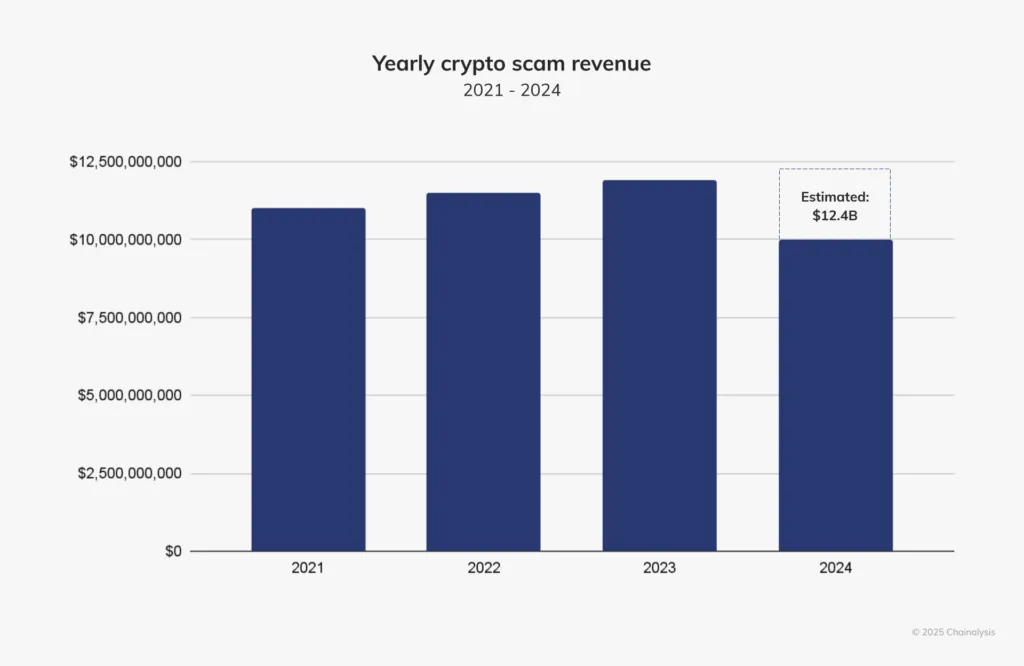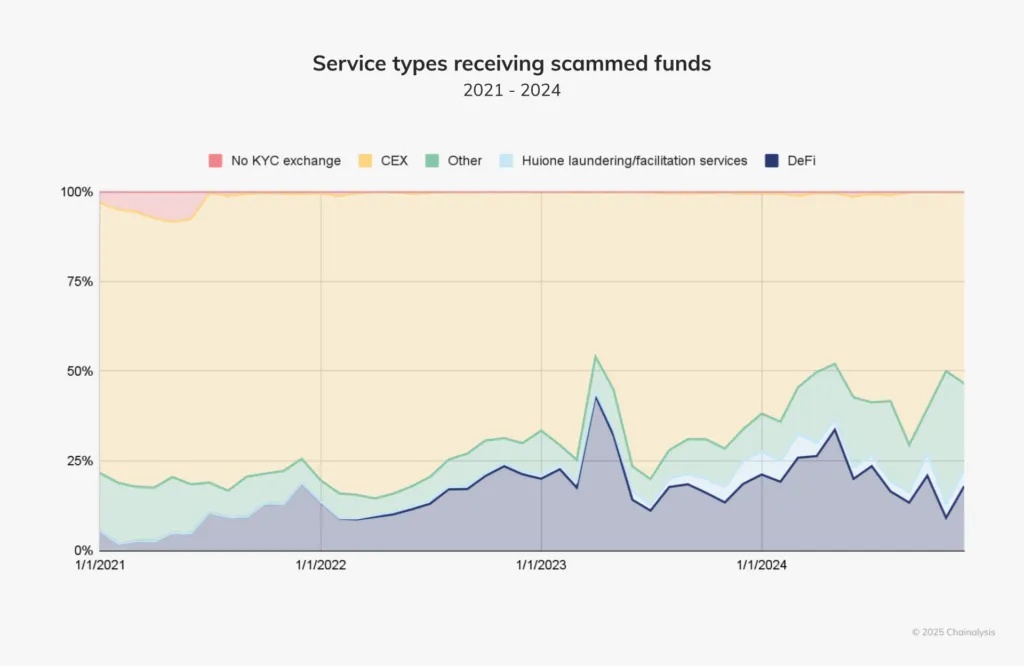|
Getting your Trinity Audio player ready...
|
It was yet another big year for digital asset criminals in 2024, a new report reveals, estimating that cybercriminals stole over $12 billion from their victims.
The ‘Crypto Scam Revenue 2024’ report by Chainalysis revealed that the actual figure lost to ‘crypto’ scams was $9.9 billion. However, the analytics firm expects to identify more illicit addresses linked to last year’s scams and push the figure to $12.4 billion.
Since Chainalysis first published its annual ‘crypto’ scam report, criminal proceeds have surged by an average of 24%.

High-yield investment scams (HYIS) and pig-butchering retained their positions as the two largest types of scams, accounting for over 80% of all funds lost by victims in 2024. HYIS scams, often presented as zero-risk investments with extremely high returns, brought in over half of all the funds lost to scammers despite a 37% decrease year-over-year. This dip was compensated for by a 40% surge in pig butchering scams.
‘Crypto’ drainer scams, usually done through phishing links and fake websites, and rug pulls were the other notable scams.
The most notable HYIS scam from 2024 was Smart Business Corp., a long-running Ponzi scheme that only recently incorporated digital assets. Last year, it received $1.5 billion in ‘crypto,’ some of which it cashed out at renowned, but unnamed, mainstream exchanges.
Pig butchering scams recorded the highest growth of any ‘crypto’ scam last year, with revenue growing 40% while individual deposits to scammers’ addresses surged 210%. The average deposit, however, dipped 55%. Chainalysis believes this indicates a shift in tactic, with the scammers now spending less time priming their targets and going for the kill quickly, resulting in lower revenue per individual.
Pig butchering scams originated in Southeast Asia, where they still retain a prominent footprint amid a global expansion. In December last year, Nigerian authorities arrested 800 individuals operating a pig butchering scam in Lagos. Other arrests made in California, Namibia, Peru and the Isle of Man show the global reach of these scams.
Traditionally, pig butchering has relied on developing personal and romantic connections with victims before scamming them. However, researchers observed that in 2024, scammers increasingly used fake job posts to target desperate job seekers, who then made payments via digital assets to secure employment.
“These scams are particularly devious because anyone who has put their resume out there and is looking for a job could easily be hooked by these, especially those desperate for work,” commented Eric Heintz, a global analyst at the International Justice Mission, which was the first to report on pig butchering scams in Asia.
Scammers continue to rely on centralized exchanges
The Chainalysis report further revealed that centralized exchanges (CEXs) remain the leading channel for scammers seeking to cash out their crime proceeds.
Criminals have long relied on CEXs with lax KYC and AML programs to cash out. However, Chainalysis data shows they are now using even the regulated platforms with industry-leading compliance mechanisms.
Since 2021, CEXs have been the most used platforms despite a surge in DeFi platform usage over the past two years.

Regulators have failed to crack down on this cashout avenue. In a few instances, authorities have charged some exchanges for facilitating transactions from criminals and failing to implement sufficient KYC and AML programs. Binance, for example, was convicted of lax AML in 2023, and its founder, Changpeng Zhao, was sentenced to four months in prison. Others like KuCoin and BitMEX have gotten away with fines.
Other authorities, like the U.S. Federal Bureau of Investigation (FBI), have resorted to preventive measures, such as notifying potential victims of ‘crypto’ scams before they parted with their money.
In a report last week, the FBI revealed that it had reached out to over 4,000 individuals across the U.S. who were in the middle of pig butchering scams and notified them of the impending danger. FBI estimates that the initiative saved the target victims $285 million in 2024.
“Victims are solicited to put money into an investment opportunity,” stated James Barnacle, the deputy director of the bureau’s criminal investigation division. He added that the scammers show the victims lucrative returns on paper or via a doctored website, but “when victims try to withdraw their money, they are denied.”
Watch: Chronicle Upgrade, Teranode, and Bitcoin Stewardship

 08-05-2025
08-05-2025 





